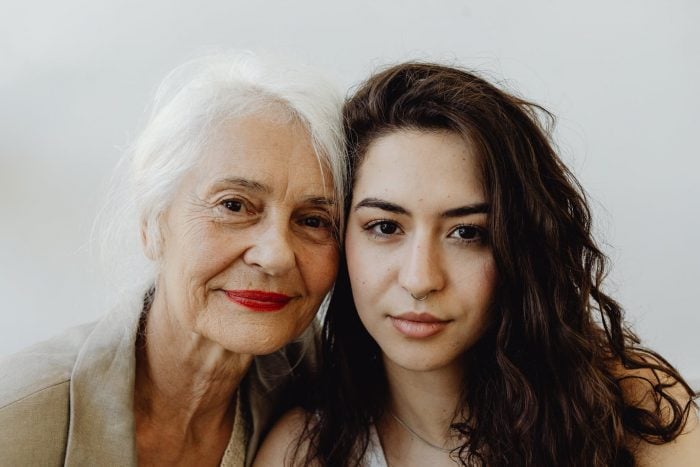I can still remember the day as if it was yesterday.
I was about 17 or 18 years old and we were visiting my father’s parents on their farm in Missouri, like we did every summer. My grandmother was standing in front of the kitchen sink, back-lit by the warm summer sun, her once long wild curly dark hair, now short and mostly grey.
She was not a physically large woman, but she made up for that in her strong and confident presence. I was sitting in the old rocker that was next to the old wood heating stove in the backside of the kitchen, across from where she stood. The kitchen had the lingering smell of the morning’s breakfast of black coffee, crispy bacon, fried eggs, and her homemade biscuits.
I honestly don’t remember what we were talking about specifically, but what she said at the moment stuck with me.
She said, “I spent my whole life holding back, doing and saying the right things. I don’t anymore. If it’s on my mind I speak it.”
We chuckled and had a laugh about it, but in thinking back, while I appreciated what she was saying, I didn’t fully understand.
When I was in my mid-20s, my younger sister and I were poking fun at each other. I was lovingly teasing her about her crow’s feet and laugh lines, which, at the time, I had none despite her being almost four years younger than me. Her retort was simply that perhaps I had not laughed or smiled enough, and therefore, not acquired any lines. We laughed and giggled and continued to poke sisterly fun at our flaws.
Years later in my 30s, I was going through a phase where my natural dark chestnut hair was dyed many colors of the rainbow. On my daily mass transit commute to New York City, I joined some friends in our “usual” four-seater row on the train. My girlfriend, who was in her mid-40s, had flawless unwrinkled skin and quite a youthful appearance. She also had long straight beautiful black hair, however, it was “salted” with grey.
I had offhandedly poked at her at how if she dyed her hair how no one would ever guess her age—she easily appeared five to 10 years younger than reality. She told me she was okay with how nature and age were progressing and had no interest in dying her hair or looking younger than she actually was. We kind of chuckled and the conversation moved on. While I understood her, I didn’t fully understand.
Fast forward time and space to late 2018. I am now in my 40s. After countless hours in a salon chair and hair colors over the previous decade—several shades of reds and blondes, even platinum–I had this moment of clarity. As I started to watch the new growth, striped within were my own silver strands. It was at that moment I decided I had no intention of dying it ever again.
This was long before COVID-19 and the grey movement, which started during it, so was met with much criticism.
“Better do something about those roots,” or, “You’re too young to be grey,” or, “Why would you do that?”
Comments not all unlike the ones I expressed to my friend those years before.
My reply was always the same: “Apparently, Mother Nature does not think I am too young to be grey!”
Society has led us to believe that when we turn 70, our hair will suddenly go white. Like all aspects of life, it’s a progression. One grey strand at a time. I knew, then, what my friend was talking about all those years ago.
Now, when I look at my face, I see plenty of crow’s feet, laugh lines, and worry wrinkles—they are evidence of my life lived to this point. Like hair, we do not wake up at 80 and suddenly our skin reflects the roadmaps of our lives lived. It’s a day-by-day progression—one laugh, tear, and worry at a time.
I am comfortable with showing I am living a full life. I don’t want to be 20 anymore, nor am I trying to appear as so.
I have always been an outspoken woman with a strong opinion; however, I will admit to having “eaten” my fair share of thoughts and opinions for the comfort of others. I have held back things as not to hurt someone’s feelings or make them feel bad or uncomfortable. There are times I have done this at my own expense.
Today, I find I am willing to do this less and less. I don’t mean I am cruel or deliberately hurtful. As a general rule, I will always try to phrase things as delicately as I can. It is now in these moments, I understand what my grandmother said while leaning on the sink in her farmhouse kitchen.
Like her, I am no longer willing to sacrifice myself for someone else’s feelings.
In all of this, the lesson is the same: aging is not about “letting ourselves go”—as society may be trying to convince us we are doing—it’s about letting go of the social constructs we are not obligated to conform to.
It’s about embracing who we are, accepting ourselves for all of our perceived flaws, and recognizing that we are perfect the way we are.
Ladies, gentlemen, they’s, and them’s: it’s time we start to accept each other and ourselves. We are just as nature has intended us to be, and we are perfect in our imperfections.


 Share on bsky
Share on bsky





Read 25 comments and reply